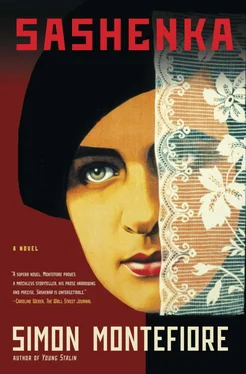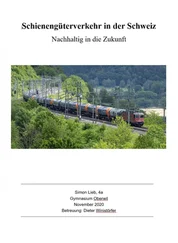Each summer Sashenka and Lala were left to their own devices in the country, though sometimes Zeitlin persuaded them to play tennis or go bicycling. Her mother, usually in the frenzy of a neuralgic crisis, mystical fad or broken heart, rarely left her room—and would soon rush back to the city. Lala spent her days collecting mushrooms and blueberries or riding Almaz the chestnut pony. Sashenka read on her own; she was always happy on her own.
That summer, Uncle Mendel had been staying too. A tiny twisted man with thick pince-nez on a big bent nose and a clubfoot, he worked all night in the library, smoking self-rolled makhorka cigarettes and brewing Turkish coffee that filled the house with its scalded, nutty aroma. He slept above the stables, lying in all morning, rising only after lunch. He seemed incapable of adapting to the summer, always wearing the same filthy dark suit and a crumpled shirt with a grimy collar. His shoes always had holes in them. Alongside her dapper father and fashionable mother, he really was a stranger from another planet. If he caught Sashenka’s eye, he scowled and glanced away. He looked terribly ill, she thought, with his pale blotchy skin and asthmatic wheeze, the fruit of years in prison and exile in Siberia.
The family despised Mendel. Even Sashenka’s mother, Mendel’s own sister, disliked him—but she let him stay. “He’s all on his own, poor sad creature,” she would say disdainfully.
And then one night Sashenka could not sleep. It was 3:00 a.m. The summer was hot and the heat gathered in her room under the roof. She wanted some lemon juice so she came downstairs, past the portrait of Count Orlov-Chesmensky, a former owner of the manor, the fifteen crystal peacocks on the shelf, and the English grandfather clock, and into the deliciously cool hall with its black and white flagstone floor. She saw the library lights were still on and smelled the coffee and smoke blending in the warm, rosy night.
Mendel opened the library door and Sashenka stepped aside into the cloakroom, from where she watched her uncle limp out with a gleam in his bloodshot eyes, a sheaf of valuable papers gripped in his claw-like hands.
The trapped miasma of an entire night’s chain-smoking poured out like a ghostly tidal wave. Sashenka waited until he had gone and then darted into the library to look at the books that so gripped him that he was happy to go to prison for them. The table was empty.
“Curious, Sashenka?” It was Mendel at the door, his voice in congruously deep and rich, his clothes defiantly moth-eaten.
She jumped. “I was just interested,” she said.
“In my books?”
“Yes.”
“I hide them when I’ve finished. I don’t like people knowing my business or even my thoughts.” He hesitated. “But you’re a serious person. The only intellectual in this family.”
“How do you know that, Uncle, since you’ve never bothered to speak to me?” Sashenka was delighted and surprised.
“The others are just capitalist decadents and our family rabbi belongs in the Middle Ages. I judge you by what you read. Mayakovsky. Nekrasov. Blok. Jack London.”
“So you’ve been watching me?”
Mendel’s pince-nez were so greasy the lenses were barely transparent. He limped over to the English collection, the full set of Dickens bound in kid with the gold Zeitlin crest, and pulling out one, he reached behind and handed her a well-thumbed old book: What Is to Be Done? by Chernyshevsky.
“Read it now. When you finish, you’ll find the next book here behind David Copperfield . Understood? We’ll take it from there.”
“Take what? From where?”
But Mendel was gone and she was alone in the library.
That was how it started. The next night, she could hardly wait until everyone was asleep before she crept down, savoring the smells of coffee and acrid makhorka tobacco as she drew closer to the set of Dickens.
“Ready for the next? Your analysis of the book?” Mendel had said without looking up.
“Rakhmetov is the most compelling hero I have ever known,” she told him, returning his book. “He is selfless, dedicated. Nothing stands in the way of his cause. The ‘special man’ touched by history. I want to be like him.”
“We all do,” he replied. “I know many Rakhmetovs. It was the first book I read too. And not just me but Lenin as well.”
“Tell me about Lenin. And what is a Bolshevik? Are you Bolshevik, Menshevik, Socialist Revolutionary, Anarchist?”
Mendel observed her as if she were a zoological specimen, narrowing his eyes, inhaling the badly rolled makhorka that caught in his throat. He coughed productively.
“What’s it to you? What do you think of Russia today, the workers, the peasants, the war?”
“I don’t know. It seems as if…” She stopped, aware of his scathing stare.
“Go on. Speak up.”
“It’s all wrong. It’s so unjust. The workers are like slaves. We’re losing the war. Everything’s rotten. Am I a revolutionary? A Bolshevik?”
Mendel rolled a new cigarette, not hurriedly and with surprising delicacy, licked the paper and lit it. An orange flame flared up and died down.
“You don’t know enough to be anything yet,” he told her. “We must take our time. You are now the sole student on my summer course. Here’s the next book.” He gave her Victor Hugo’s novel of the French Revolution, 1793 .
The next night she was even more excited.
“Ready for more? Your analysis?”
“Cimourdain had never been seen to weep,” she quoted Hugo’s description of his hero. “He had an inaccessible and frigid virtue. A just but awful man. There are no half measures for a revolutionary priest who must be infamous and sublime. Cimourdain was sublime, rugged, inhospitably repellent, gloomy but above all pure.”
“Good. If Cimourdain were alive today, he’d be a Bolshevik. You have the sentiment; now you need the science. Marxism is a science. Now read this.” He held up a novel called Lady Cynthia de Fortescue and the Love of the Cruel Colonel . On its cover stood a lady with vermilion lipstick and cheeks like a puff adder, while a devilishly handsome officer with waxed mustaches and narrowed eyes lurked behind.
“What’s this?” she asked.
“Just read what I give you.” Mendel was back at his desk, scratching with his pen.
In her bedroom, when she opened the book, she found Marx’s Communist Manifesto hidden inside. This was soon followed by Plekhanov, Engels, Lassalle, more Marx, Lenin.
No one had ever spoken to Sashenka like Mendel. Her mother wanted her to be a foolish child preparing for a life of overheated balls, unhappy marriages and seedy adulteries. She adored her father but he barely noticed his “little fox,” regarding her as no more than a fluffy mascot. And darling Lala had long since submitted to her place in life, reading only novels like Lady Cynthia de Fortescue and the Love of the Cruel Colonel . As for Uncle Gideon, he was a degenerate sensualist who had tried to flirt with her, and once even patted her behind.
At meals and parties she barely spoke, so rapt was she by her short course in Marxism, so keen was she to ask Mendel more questions. Her mind was with him in his smoky library, far from her mother and father. Lala, who sometimes found her asleep with the lamp shining and some vulgar novel beside her, worried that she was reading too late. It was Mendel who exposed Sashenka to the grotesque injustice of capitalist society, to the oppression of workers and peasants, and showed her how Zeitlin—yes, her own father—was an exploiter of the working man.
But there was a solution, she learned: a class struggle that would progress through set stages to a workers’ paradise of equality and decency. The Marxist theory was universal and utopian and all human existence fitted into its beautiful symmetry of history and justice. She could not understand why the workers of the industrial world, especially in St. Petersburg and Moscow, the peasants in the villages of Russia and Ukraine, the footmen and maids in her father’s houses, did not rise up and slay their masters at once. She had fallen in love with the ideas of dialectical materialism and the dictatorship of the proletariat.
Читать дальше












